Recap
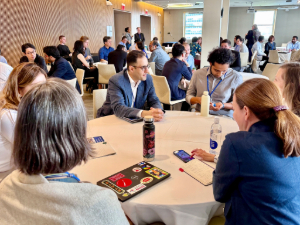 Introduction - The 2025 ISA Annual Conference convened at MIT's Samberg Conference Center and Sloan School, drawing over 225 attendees and featuring more than 230 research papers. This year's gathering offered a multidisciplinary window into the industries shaping our economic and technological future. Across three days of panels, plenaries, and policy discussions, researchers and practitioners explored how industries and industrial systems are adapting to capital market and supply chain pressures, digitalization, geopolitical realignments, and workforce transitions. Introduction - The 2025 ISA Annual Conference convened at MIT's Samberg Conference Center and Sloan School, drawing over 225 attendees and featuring more than 230 research papers. This year's gathering offered a multidisciplinary window into the industries shaping our economic and technological future. Across three days of panels, plenaries, and policy discussions, researchers and practitioners explored how industries and industrial systems are adapting to capital market and supply chain pressures, digitalization, geopolitical realignments, and workforce transitions.
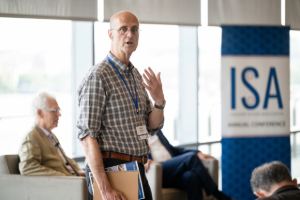 A Platform for Ideas Rooted in Practice - ISA brings together researchers from management, economics, engineering, sociology, and public policy who study firms, supply chains, and institutions from the ground up. This year's sessions addressed topics ranging from the impact of generative AI on organizational design to pharmaceutical supply chain resilience, capital misalignment in advanced manufacturing, and comparative industrial policy design. A Platform for Ideas Rooted in Practice - ISA brings together researchers from management, economics, engineering, sociology, and public policy who study firms, supply chains, and institutions from the ground up. This year's sessions addressed topics ranging from the impact of generative AI on organizational design to pharmaceutical supply chain resilience, capital misalignment in advanced manufacturing, and comparative industrial policy design.
Factory Tours - Small groups of ISA attendees toured three cutting-edge manufacturing and innovation facilities. VulcanForms, featured in the New York Times, has revolutionized metal 3D printing by operating a high-volu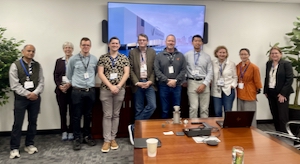 me foundry that produces precision parts for the medical, aerospace, and defense sectors. Visitors explored multiple generations of Vulcan's technology and observed a unique production model where operators monitor quality and productivity from a centralized control room. Commonwealth Fusion Systems, which has raised close to $2 billion and also located in Devens, MA, is at the forefront of the global race for fusion energy.The tour showcased their pioneering work in building reactor components, including massive, high-precision magnets, highlighting the intersection of nuclear physics and advanced manufacturing. Finally, MassRobotics in Boston offered a glimpse into the future of robotics innovation. As a startup hub and accelerator, it supports the development and commercialization of next-generation robotics technologies. The visit included demonstrations, discussions with resident startups, and insights into how MassRobotics fosters collaboration across academia, industry, and government. me foundry that produces precision parts for the medical, aerospace, and defense sectors. Visitors explored multiple generations of Vulcan's technology and observed a unique production model where operators monitor quality and productivity from a centralized control room. Commonwealth Fusion Systems, which has raised close to $2 billion and also located in Devens, MA, is at the forefront of the global race for fusion energy.The tour showcased their pioneering work in building reactor components, including massive, high-precision magnets, highlighting the intersection of nuclear physics and advanced manufacturing. Finally, MassRobotics in Boston offered a glimpse into the future of robotics innovation. As a startup hub and accelerator, it supports the development and commercialization of next-generation robotics technologies. The visit included demonstrations, discussions with resident startups, and insights into how MassRobotics fosters collaboration across academia, industry, and government.
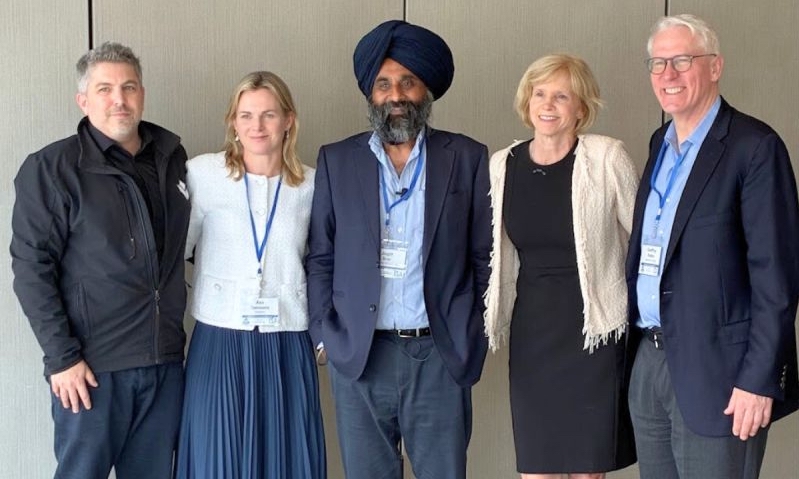 Opening Plenary: Digitalization, Platforms, and Ecosystems - The opening plenary framed the week around the organizational implications of digital transformation. Elisabeth Reynolds (MIT) moderated a high-energy exchange with Geoffrey Parker (Dartmouth), Jagjit Singh Srai (Cambridge), Åsa Tamsons (Ericsson), and Natan Linder (Tulip Interfaces). Panelists described how ecosystems are increasingly replacing vertical integration, with AI and platforms reshaping not just markets but internal firm structure. Srai emphasized that future competitiveness will hinge on how quickly firms integrate modular technologies across fragmented value chains. Opening Plenary: Digitalization, Platforms, and Ecosystems - The opening plenary framed the week around the organizational implications of digital transformation. Elisabeth Reynolds (MIT) moderated a high-energy exchange with Geoffrey Parker (Dartmouth), Jagjit Singh Srai (Cambridge), Åsa Tamsons (Ericsson), and Natan Linder (Tulip Interfaces). Panelists described how ecosystems are increasingly replacing vertical integration, with AI and platforms reshaping not just markets but internal firm structure. Srai emphasized that future competitiveness will hinge on how quickly firms integrate modular technologies across fragmented value chains.
Special Session: The Future of Energy - David Hart (George Mason) led a discussion focused on 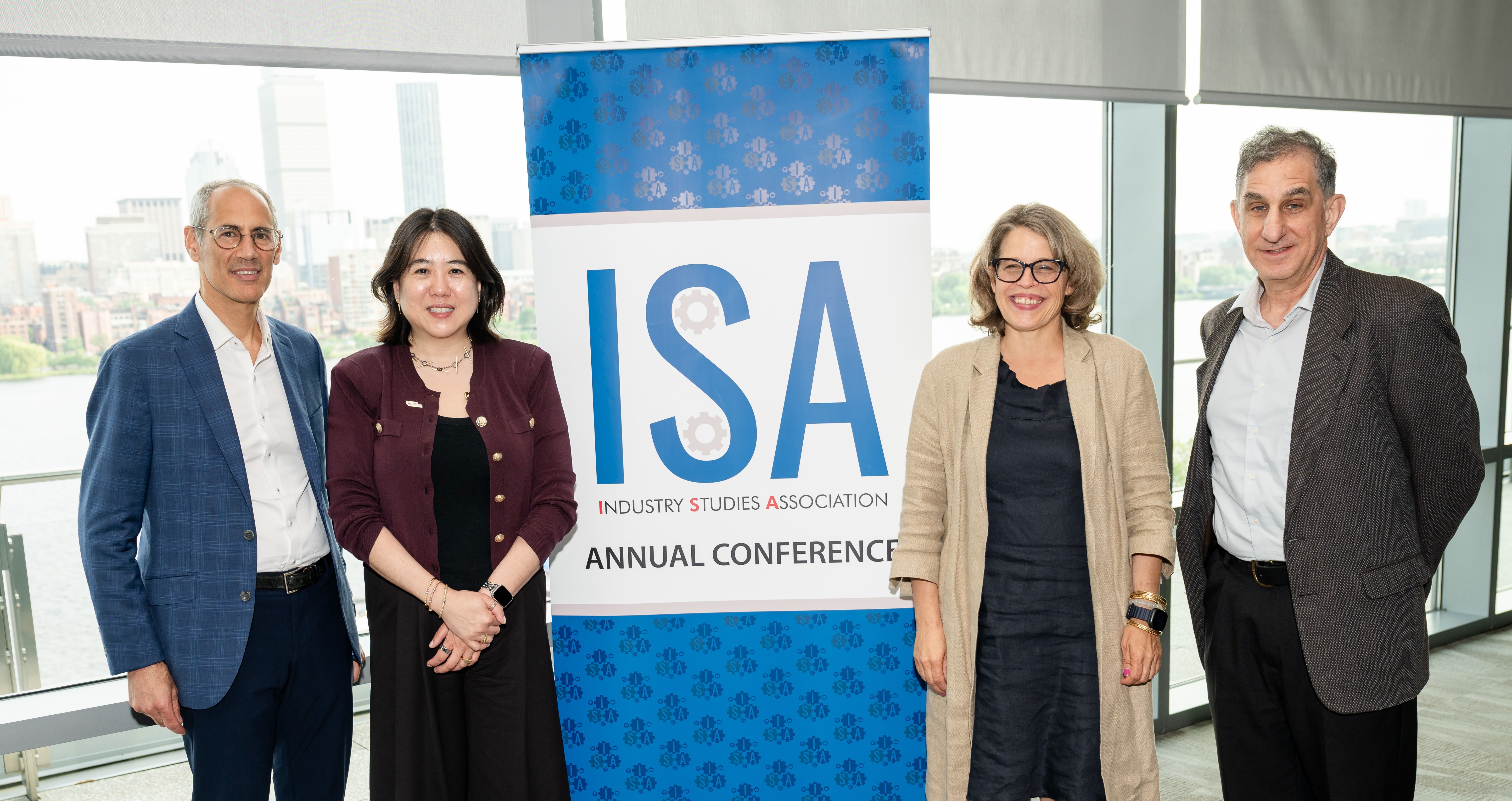 innovation bottlenecks and financing gaps in decarbonization. Katie Rae (Engine Ventures), Vanessa Chan (Penn Engineering), and Daniel Goldman (Clean Energy Ventures) highlighted how early-stage climate-tech firms struggle with pilot funding, supply chain readiness, and regulatory uncertainty. Rae noted that the "valley of death" for hardware innovation remains dangerously wide, despite bipartisan interest. Goldman called for new financial instruments to unlock deployment capital for first-of-a-kind infrastructure. innovation bottlenecks and financing gaps in decarbonization. Katie Rae (Engine Ventures), Vanessa Chan (Penn Engineering), and Daniel Goldman (Clean Energy Ventures) highlighted how early-stage climate-tech firms struggle with pilot funding, supply chain readiness, and regulatory uncertainty. Rae noted that the "valley of death" for hardware innovation remains dangerously wide, despite bipartisan interest. Goldman called for new financial instruments to unlock deployment capital for first-of-a-kind infrastructure.
Special Session: The Future of Biotechnology - Moderated by Chris Love (MIT), this session brought together Rahul 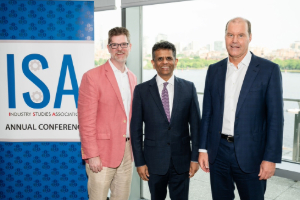 Singhvi (former CEO, National Resilience), and Christophe Weber (CEO, Takeda) to discuss global competitiveness in biomanufacturing. Singhvi emphasized the need for distributed, platform-based production infrastructure to withstand geopolitical and public health shocks. Weber called attention to the regulatory fragmentation and patent policy headwinds that limit cross-border innovation. Panelists agreed that next-generation therapies will demand both organizational and policy innovation. Singhvi (former CEO, National Resilience), and Christophe Weber (CEO, Takeda) to discuss global competitiveness in biomanufacturing. Singhvi emphasized the need for distributed, platform-based production infrastructure to withstand geopolitical and public health shocks. Weber called attention to the regulatory fragmentation and patent policy headwinds that limit cross-border innovation. Panelists agreed that next-generation therapies will demand both organizational and policy innovation.
Evening Plenary: The New Lunar Society - David Mindell (MIT) and Richard Lester (MIT) reflected on how 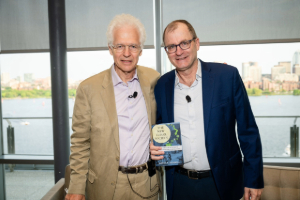 Enlightenment values—evidence, humility, collaboration—might guide industrial reinvention. Mindell outlined his vision for a more ethical, interdisciplinary industrial culture rooted in curiosity and experimentation. Lester added historical depth, connecting past moments of industrial reorganization to today's twin transitions in energy and digital systems. The session underscored ISA's unique positioning at the intersection of technical rigor and institutional imagination. Enlightenment values—evidence, humility, collaboration—might guide industrial reinvention. Mindell outlined his vision for a more ethical, interdisciplinary industrial culture rooted in curiosity and experimentation. Lester added historical depth, connecting past moments of industrial reorganization to today's twin transitions in energy and digital systems. The session underscored ISA's unique positioning at the intersection of technical rigor and institutional imagination.
Special Tribute: Richard Lester and the Legacy of Industry Studies at MIT - Following the plenary, MIT President 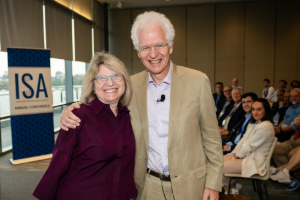 Sally Kornbluth and ISA leaders Liz Reynolds (MIT) and John Paul MacDuffie (Wharton) delivered a heartfelt tribute honoring Richard Lester for his pioneering role in shaping the field of industry studies. Lester helped found MIT's Industrial Performance Center and played a leading role in launching the Sloan Foundation's Industry Studies Initiative, which funded 22 centers nationwide from 1990 to 2008. MIT's early work through the International Motor Vehicle Program (IMVP)—a global study that introduced "lean production" to academic and industrial audiences—served as a blueprint for Sloan's approach. Under Lester's leadership, MIT became home to the IPC, which became a Sally Kornbluth and ISA leaders Liz Reynolds (MIT) and John Paul MacDuffie (Wharton) delivered a heartfelt tribute honoring Richard Lester for his pioneering role in shaping the field of industry studies. Lester helped found MIT's Industrial Performance Center and played a leading role in launching the Sloan Foundation's Industry Studies Initiative, which funded 22 centers nationwide from 1990 to 2008. MIT's early work through the International Motor Vehicle Program (IMVP)—a global study that introduced "lean production" to academic and industrial audiences—served as a blueprint for Sloan's approach. Under Lester's leadership, MIT became home to the IPC, which became a 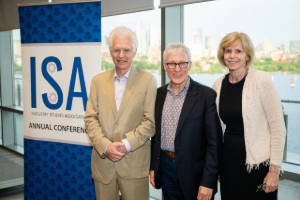 coordinating hub for cross-industry research on productivity, innovation, and competition. Many of the early Sloan Centers became the institutional backbone of what would eventually become the Industry Studies Association. Lester was a founding ISA board member and longtime advocate for field-based, comparative research, President Kornbluth recognized him not just for his scholarship, but for building institutional structures that have shaped generations of researchers—including many ISA leaders and attendees. coordinating hub for cross-industry research on productivity, innovation, and competition. Many of the early Sloan Centers became the institutional backbone of what would eventually become the Industry Studies Association. Lester was a founding ISA board member and longtime advocate for field-based, comparative research, President Kornbluth recognized him not just for his scholarship, but for building institutional structures that have shaped generations of researchers—including many ISA leaders and attendees.
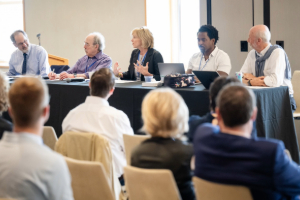 Special Session: Comparative Industrial Policy - Andrew Reamer (GWU) moderated a wide-ranging panel on how countries are rewriting the playbook on industrial strategy. Elisabeth Reynolds (MIT), Sir Mike Gregory (Cambridge), Bill Janeway (Warburg Pincus), and Jason Jackson (MIT) discussed the purpose and scope of modern industrial policy. Gregory stressed that policy coherence and institutional learning matter more than picking sectors. Janeway emphasized the need for patient capital and a re-legitimization of government's coordinating role. Special Session: Comparative Industrial Policy - Andrew Reamer (GWU) moderated a wide-ranging panel on how countries are rewriting the playbook on industrial strategy. Elisabeth Reynolds (MIT), Sir Mike Gregory (Cambridge), Bill Janeway (Warburg Pincus), and Jason Jackson (MIT) discussed the purpose and scope of modern industrial policy. Gregory stressed that policy coherence and institutional learning matter more than picking sectors. Janeway emphasized the need for patient capital and a re-legitimization of government's coordinating role.
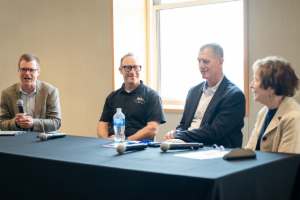 Special Session: New Organizational Structures for Manufacturing - Ben Armstrong and Suzanne Berger (MIT) convened Miles Arnone (Re:Build) and Steve Cook (LFM Capital) to explore long-term manufacturing investment. Arnone argued that traditional VC and PE models are mismatched for physical industries with longer payback periods. Cook emphasized how private equity can still support industrial firms, but only with revised expectations around return timelines. Berger noted that this moment resembles prior manufacturing "rebirths" that required both capital and coalitional support. Special Session: New Organizational Structures for Manufacturing - Ben Armstrong and Suzanne Berger (MIT) convened Miles Arnone (Re:Build) and Steve Cook (LFM Capital) to explore long-term manufacturing investment. Arnone argued that traditional VC and PE models are mismatched for physical industries with longer payback periods. Cook emphasized how private equity can still support industrial firms, but only with revised expectations around return timelines. Berger noted that this moment resembles prior manufacturing "rebirths" that required both capital and coalitional support.
Plenary: Learning Across Industries and Industry Evolution - John Paul MacDuffie (Wharton), Eleanor Westney 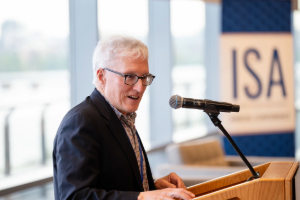 (MIT/York), Takafumi Kurosawa (Kyoto), and Gary Gereffi (Duke) asked how general lessons can be drawn from deep industry studies. Kurasawa offered a historical taxonomy of how "industry" has been defined across time and space. Gereffi emphasized the need for scholars to track governance shifts in global value chains especially amid protectionism. Westney reflected on editing the Oxford Handbook of Industry Dynamics and the value of comparative case logic. (MIT/York), Takafumi Kurosawa (Kyoto), and Gary Gereffi (Duke) asked how general lessons can be drawn from deep industry studies. Kurasawa offered a historical taxonomy of how "industry" has been defined across time and space. Gereffi emphasized the need for scholars to track governance shifts in global value chains especially amid protectionism. Westney reflected on editing the Oxford Handbook of Industry Dynamics and the value of comparative case logic.
Special Session: Workforce Development in a Post-College World - Ben Armstrong (MIT) moderated a timely panel on the decline of traditional igher ed pathways. Layla O'Kane (Opportunity@Work), Christophe Combemale (Carnegie Mellon), and Julia Pollak (U.S. Department of Labor) discussed the growing role of sector-based training, skills taxonomies, and workforce analytics. Combemale present NSF-funded work linking technological change to skill shifts. Pollak emphasized that workforce development is a supply chain challenge—and policymakers need better data.
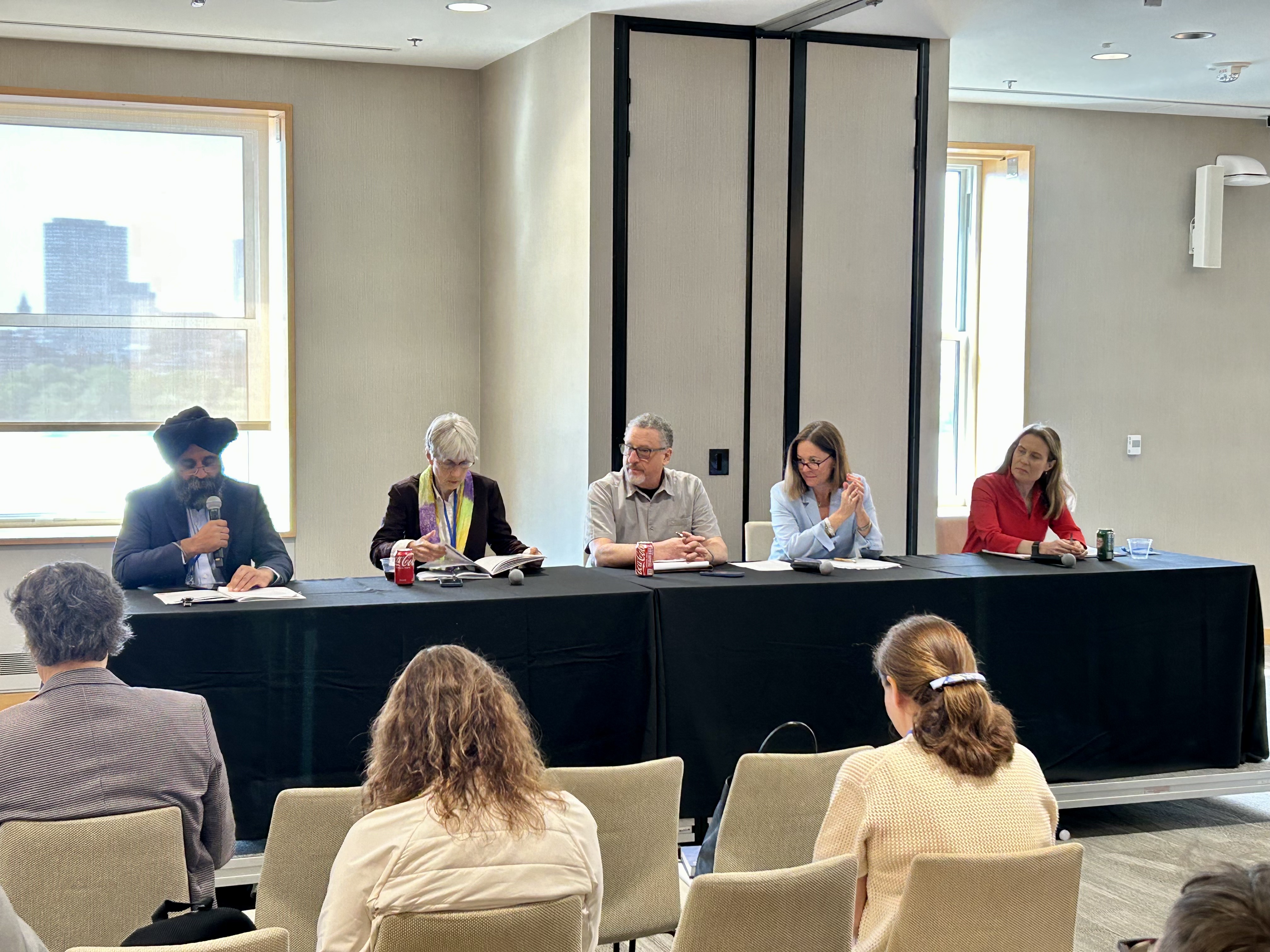 Special Session: Supply Chains and Geography in a Geopolitical Era - Jagjit Srai (Cambridge) led Susan Helper (Case Western), Fiona Murray (MIT), Monica Gorman (Crowell), and Tim Sturgeon (MIT) through a discussion on global supply chain redesign. Sturgeon argued that reshoring must be understood as a sector-specific architectural problem. Helper called for federal "stress tests" of critical supply chains, akin to financial regulation. Murray emphasized aligning innovation policy with geography to avoid both duplication and fragility. Special Session: Supply Chains and Geography in a Geopolitical Era - Jagjit Srai (Cambridge) led Susan Helper (Case Western), Fiona Murray (MIT), Monica Gorman (Crowell), and Tim Sturgeon (MIT) through a discussion on global supply chain redesign. Sturgeon argued that reshoring must be understood as a sector-specific architectural problem. Helper called for federal "stress tests" of critical supply chains, akin to financial regulation. Murray emphasized aligning innovation policy with geography to avoid both duplication and fragility.
Research Highlights from Paper Presentations - Among the 230+ papers, standouts included:
- “Clause and Effect: Theory and Field Experimental Evidence on Noncompete Clauses” by Bo Cowgill (Columbia), Brandon Freiberg (Columbia), and Evan Starr (Maryland), which linked clause enforceability to entrepreneurship outcomes.
- “Balancing Novelty, Safety, and Availability in Pharmaceutical Supply Chains” by Hanu Tyagi (Illinois), exploring tradeoffs in generics resilience.
- “Machine Predictions and Causal Explanations: Evidence from a Field Experiment” by Hyunjin Kim (INSEAD), which examined how AI shapes managerial decision-making.
- “Giving Up Learning from Failures?” by Sunkee Lee (Carnegie Mellon) and Jisoo Park (Clark), a study of surgical teams and the complexity of organizational learning.
Also noteworthy were sessions on AI in supply chain risk mitigation, renewable energy integration, and the role of geopolitics in semiconductor reshuffling. Presenters came from over 100 institutions and 10 countries, adding global depth to the analysis.
Award Winners -
Best Paper in Innovation & Entrepreneurship:
Bo Cowgill (Columbia), Brandon Freiberg (Columbia), Evan Starr (University of Maryland). “Clause and Effect: Theory and field experimental evidence on noncompete clauses”
Dissertation Award:
Hanu Tyagi (University of Illinois Urbana-Champaign; PhD, University of Minnesota), “Balancing Novelty, Safety, and Availability in Pharmaceutical Supply Chains”
Giarratani Rising Star Award:
Hyunjin Kim (INSEAD), “Machine Predictions and Causal Explanations: Evidence from a Field Experiment”
Babbage International Policy Forum Industrial Policy Award:
Hanu Tyagi (University of Illinois Urbana-Champaign; PhD, University of Minnesota), “Does Transparency Hinder Technological Novelty? Evidence from Large Pharmaceutical Firms”
Ralph Gomory Best Industry Studies Paper Award (tie):
Sunkee Lee (Carnegie Mellon) and Jisoo Park (Clark University), “Giving Up Learning from Failures?” (Strategic Management Journal)
Rakesh Allu (Cornell), Maya Ganesh (IIM Ahmedabad), Sarang Deo and Sripad Devalkar (ISB Hyderabad), “Technology-Enabled Agent Choice and Social Assistance Uptake” (M&SOM
 Looking Ahead - ISA returns in 2026 with two major gatherings: the annual conference in Washington, D.C. and its first international conference in Oxford, UK. As the world contends with AI disruption, reindustrialization, and new industrial policy regimes, ISA remains the essential home for scholarship that connects theory with practice. Looking Ahead - ISA returns in 2026 with two major gatherings: the annual conference in Washington, D.C. and its first international conference in Oxford, UK. As the world contends with AI disruption, reindustrialization, and new industrial policy regimes, ISA remains the essential home for scholarship that connects theory with practice.
|


 Introduction
Introduction  A Platform for Ideas Rooted in Practice
A Platform for Ideas Rooted in Practice me foundry that produces precision parts for the medical, aerospace, and defense sectors. Visitors explored multiple generations of
me foundry that produces precision parts for the medical, aerospace, and defense sectors. Visitors explored multiple generations of 
 innovation bottlenecks and financing gaps in decarbonization. Katie Rae (Engine Ventures), Vanessa Chan (Penn Engineering), and Daniel Goldman (Clean Energy Ventures) highlighted how early-stage climate-tech firms struggle with pilot funding, supply chain readiness, and regulatory uncertainty. Rae noted that the "valley of death" for hardware innovation remains dangerously wide, despite bipartisan interest. Goldman called for new financial instruments to unlock deployment capital for first-of-a-kind infrastructure.
innovation bottlenecks and financing gaps in decarbonization. Katie Rae (Engine Ventures), Vanessa Chan (Penn Engineering), and Daniel Goldman (Clean Energy Ventures) highlighted how early-stage climate-tech firms struggle with pilot funding, supply chain readiness, and regulatory uncertainty. Rae noted that the "valley of death" for hardware innovation remains dangerously wide, despite bipartisan interest. Goldman called for new financial instruments to unlock deployment capital for first-of-a-kind infrastructure. Singhvi (former CEO, National Resilience), and Christophe Weber (CEO, Takeda) to discuss global competitiveness in biomanufacturing. Singhvi emphasized the need for distributed, platform-based production infrastructure to withstand geopolitical and public health shocks. Weber called attention to the regulatory fragmentation and patent policy headwinds that limit cross-border innovation. Panelists agreed that next-generation therapies will demand both organizational and policy innovation.
Singhvi (former CEO, National Resilience), and Christophe Weber (CEO, Takeda) to discuss global competitiveness in biomanufacturing. Singhvi emphasized the need for distributed, platform-based production infrastructure to withstand geopolitical and public health shocks. Weber called attention to the regulatory fragmentation and patent policy headwinds that limit cross-border innovation. Panelists agreed that next-generation therapies will demand both organizational and policy innovation. Enlightenment values—evidence, humility, collaboration—might guide industrial reinvention. Mindell outlined his vision for a more ethical, interdisciplinary industrial culture rooted in curiosity and experimentation. Lester added historical depth, connecting past moments of industrial reorganization to today's twin transitions in energy and digital systems. The session underscored ISA's unique positioning at the intersection of technical rigor and institutional imagination.
Enlightenment values—evidence, humility, collaboration—might guide industrial reinvention. Mindell outlined his vision for a more ethical, interdisciplinary industrial culture rooted in curiosity and experimentation. Lester added historical depth, connecting past moments of industrial reorganization to today's twin transitions in energy and digital systems. The session underscored ISA's unique positioning at the intersection of technical rigor and institutional imagination. Sally Kornbluth and ISA leaders Liz Reynolds (MIT) and John Paul MacDuffie (Wharton) delivered a heartfelt tribute honoring Richard Lester for his pioneering role in shaping the field of industry studies. Lester helped found MIT's Industrial Performance Center and played a leading role in launching the Sloan Foundation's Industry Studies Initiative, which funded 22 centers nationwide from 1990 to 2008. MIT's early work through the International Motor Vehicle Program (IMVP)—a global study that introduced "lean production" to academic and industrial audiences—served as a blueprint for Sloan's approach. Under Lester's leadership, MIT became home to the IPC, which became a
Sally Kornbluth and ISA leaders Liz Reynolds (MIT) and John Paul MacDuffie (Wharton) delivered a heartfelt tribute honoring Richard Lester for his pioneering role in shaping the field of industry studies. Lester helped found MIT's Industrial Performance Center and played a leading role in launching the Sloan Foundation's Industry Studies Initiative, which funded 22 centers nationwide from 1990 to 2008. MIT's early work through the International Motor Vehicle Program (IMVP)—a global study that introduced "lean production" to academic and industrial audiences—served as a blueprint for Sloan's approach. Under Lester's leadership, MIT became home to the IPC, which became a  coordinating hub for cross-industry research on productivity, innovation, and competition. Many of the early Sloan Centers became the institutional backbone of what would eventually become the Industry Studies Association. Lester was a founding ISA board member and longtime advocate for field-based, comparative research, President Kornbluth recognized him not just for his scholarship, but for building institutional structures that have shaped generations of researchers—including many ISA leaders and attendees.
coordinating hub for cross-industry research on productivity, innovation, and competition. Many of the early Sloan Centers became the institutional backbone of what would eventually become the Industry Studies Association. Lester was a founding ISA board member and longtime advocate for field-based, comparative research, President Kornbluth recognized him not just for his scholarship, but for building institutional structures that have shaped generations of researchers—including many ISA leaders and attendees. Special Session: Comparative Industrial Policy
Special Session: Comparative Industrial Policy Special Session: New Organizational Structures for Manufacturing
Special Session: New Organizational Structures for Manufacturing (MIT/York), Takafumi Kurosawa (Kyoto), and Gary Gereffi (Duke) asked how general lessons can be drawn from deep industry studies. Kurasawa offered a historical taxonomy of how "industry" has been defined across time and space. Gereffi emphasized the need for scholars to track governance shifts in global value chains especially amid protectionism. Westney reflected on editing the Oxford Handbook of Industry Dynamics and the value of comparative case logic.
(MIT/York), Takafumi Kurosawa (Kyoto), and Gary Gereffi (Duke) asked how general lessons can be drawn from deep industry studies. Kurasawa offered a historical taxonomy of how "industry" has been defined across time and space. Gereffi emphasized the need for scholars to track governance shifts in global value chains especially amid protectionism. Westney reflected on editing the Oxford Handbook of Industry Dynamics and the value of comparative case logic. Special Session: Supply Chains and Geography in a Geopolitical Era
Special Session: Supply Chains and Geography in a Geopolitical Era Looking Ahead
Looking Ahead
